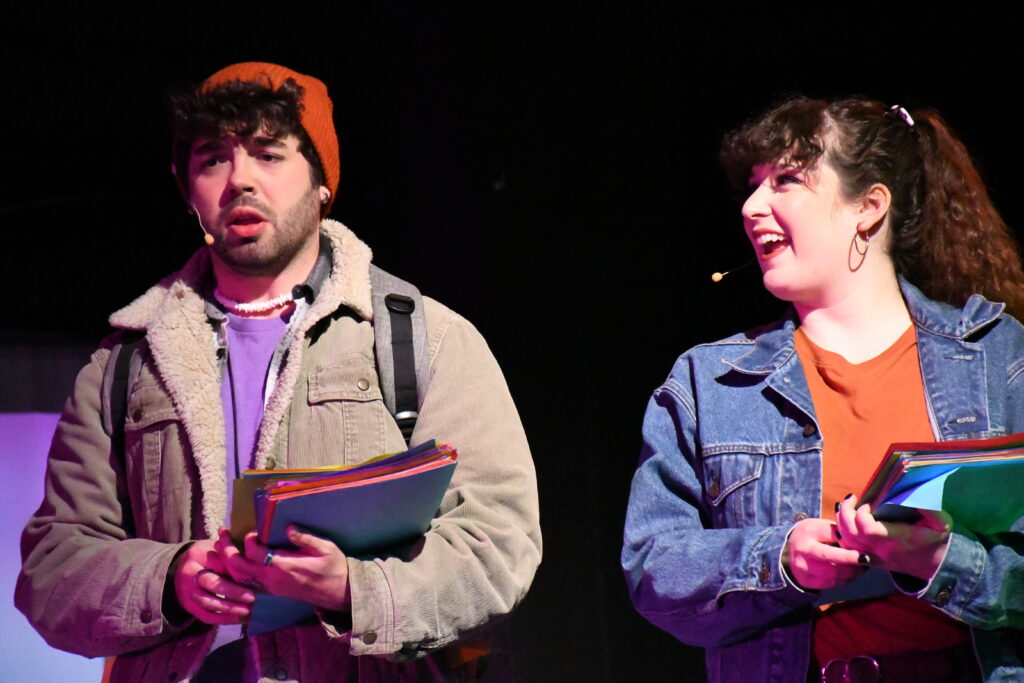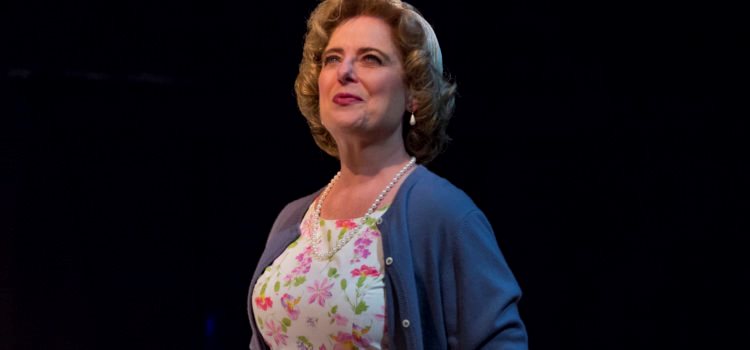By Lynn Venhaus
What a pleasant surprise the leap of faith “Ordinary Days” is – as the inaugural musical presentation of Tesseract Theatre Company, as an original musical by Adam Gwon, as a coda to this year and as a reflective piece for our third winter of a pandemic.
An intimate, affecting sung-through musical that intersects the lives of four young New Yorkers, “Ordinary Days” resonates with its struggles, search for fulfillment and the palpable sense of yearning from the new-to-me quartet.
Discovering the vocal talents and comedic timing of Brittani O’Connell, Jacob Schmidt, Micheal Lowe, and Lauren Tenenbaum is also part of the fresh-and-fun experience.
As directed by veteran Elisabeth Wurm, the cast maneuvers like the New Yorkers they portray. There’s a certain rhythm to moving around the city, and the four performers nail the aptitude and the attitude. (Full disclosure: my youngest son has lived there since 2011, so I have visited over the years, and have observed the natives, transplants, and tourists.)
When navigating the hustle and bustle, I am often reminded of Stephen Sondheim’s lyrics to “Another Hundred People” in “Company”: “It’s a city of strangers, Some come to work, some to play… Some come to stare, some to stay And every day The ones who stay
Can find each other in the crowded streets and the guarded parks…”
Worried about their futures while still clinging to their hopes and dreams, these two pairs have found each other in a city misrepresented by a cold-hearted perception. It’s not, but you must learn survival — “If I can make it there, I can make it anywhere” is pretty much true.
Tenenbaum is Deb, a small-town girl with dreams of more, who is in grad school and misplaces a notebook crucial to her thesis. It’s found by Warren, a guileless goofy guy played by Schmidt, who is too pleasant and agreeable for his own good, for he’s one of those random guys passing out flyers on the street who is repeatedly ignored. His job is cat-sitting but he’s the proverbial struggling artist. He’s desperate to fit in – can he still be chipper when trying not to get swallowed whole by the city?
Frazzled high-strung Deb is always in a hurry, and will eventually learn to be in the moment, or else the treasured little things in life will pass her by. She thinks Warren is weird, but eventually they become good friends.

The other couple is romantically linked. They have been together for a while but mulling over taking it to the next level, as Jason moves his things in to Claire’s. But something isn’t quite right. O’Connell plays Claire, whose backstory includes a 9-11 casualty, and Lowe is Jason, whose journey leads to commitment, but is Claire ready?
Learning to appreciate the simple things of life – while feeling lonely, isolated, and out of sorts – has been a common theme during the coronavirus pandemic, which has brought a gamut of emotions to the surface since March 2020.
So, Adam Gwon’s play, written in 2008, takes place in 2005, which is important for the actions and transitions. It is a marvel of relatable key moments – Oh, youth! The 30s! – and somehow, reverberates with the same contemplations we’ve had during this pandemic era of uncertainty.
Gwon is a noteworthy talent, included in Dramatists Magazine’s “50 to Watch,” and “Ordinary Days” put him on the map. His lyrics are sharp and vibrant, have an everyman quality and universal appeal. (He also wrote the revue “Old Jews Telling Jokes,” which was presented by New Jewish Theatre in 2014.)
Tesseract’s presentation of “Ordinary Days” is a fine introduction to his music, and Music Director Zach Neumann deftly plays the keyboards and keeps the pace brisk for the singers, whose strong enunciations and interpretations really make the vivid lyrics hit home.
Schmidt sets a convivial tone with “One By One By One,” then shades his character’s personality through “Life Story” – his heart and his humor apparent.
Tenenbaum, also quirky but bursting with possibilities, explains her life to date in “Don’t Wanna Be Here” and her mojo in “Dear Professor Thompson, Part I” – continuing her funny bundle of nerves.
Deb and Warren’s meet-cute at The Metropolitan Museum of Art turns into a sweet duet “Sort of Fairy Tale” – ‘violent punctuation”! And continues with “Big Picture.”

The Met figures into Claire and Jason’s relationship, but not as positive as the other pair’s.
While moving in, gifted vocalists O’Connell and Lowe explore their next-step feelings in “Let Things Go” and “The Space Between,” and go through their stuff in “I’m Trying.” They succinctly sum up a couple’s argument with a lighter humorous touch in “Fine.”
Among the most poignant is O’Connell’s “I’ll Be Here” – which should elicit leaky eyes from nearly everyone – and Lowe’s simple but so eloquent “Favorite Places.”
The hits just keep on coming — “Hundred-Story City” captures the love-hate relationship that New Yorkers have with the concrete jungle. And “Rooftop Duet/Falling” ties the show together.
Claire has realized she must let go of the past before she can move on, and O’Connell’s character arc is the deepest felt, but all performances are warm and captivating. They harmoniously come together in the stirring finale “Beautiful.”
With the focus squarely on the individuals and how they factor in with others, the set design is simple, and relies on photographs projected on the large screen – sights of living in New York City. (NYC always feels familiar because we’ve seen it so many times in entertainment.)
If you feel that you have taken away from our recent 21st century life-and-death experience the importance of connection, like I have, then this timely and charming reminder to appreciate beauty and joy in our lives, no matter how small or fleeting, delivers its heartfelt message as only live theater can.
This may be Tesseract’s first musical, but it won’t be their last, as they are planning to present the two-hander “The Last Five Years” by Jason Robert Brown in February and the Tony Award winner for Best Musical in 2013, “Kinky Boots,” later this year.
I’m liking this leap of faith Taylor Gruenloh has set his company on – and the first step is a knockout, a memorable musical for our times. Dare I say “optimistic”?

Tesseract Theatre Company presents “Ordinary Days” Nov. 18-27 on Friday at 8 p.m., Saturday at 8 p.m., and Sunday at 4 p.m. at the. Zack Theatre, 3224 Locust. Tickets are available at MetroTix.com or at the box office before the performance. $25 for general audience and $20 for students. For more information, visit www.tesseracttheatre.com

Lynn (Zipfel) Venhaus has had a continuous byline in St. Louis metro region publications since 1978. She writes features and news for Belleville News-Democrat and contributes to St. Louis magazine and other publications.
She is a Rotten Tomatoes-approved film critic, currently reviews films for Webster-Kirkwood Times and KTRS Radio, covers entertainment for PopLifeSTL.com and co-hosts podcast PopLifeSTL.com…Presents.
She is a member of Critics Choice Association, where she serves on the women’s and marketing committees; Alliance of Women Film Journalists; and on the board of the St. Louis Film Critics Association. She is a founding and board member of the St. Louis Theater Circle.
She is retired from teaching journalism/media as an adjunct college instructor.



